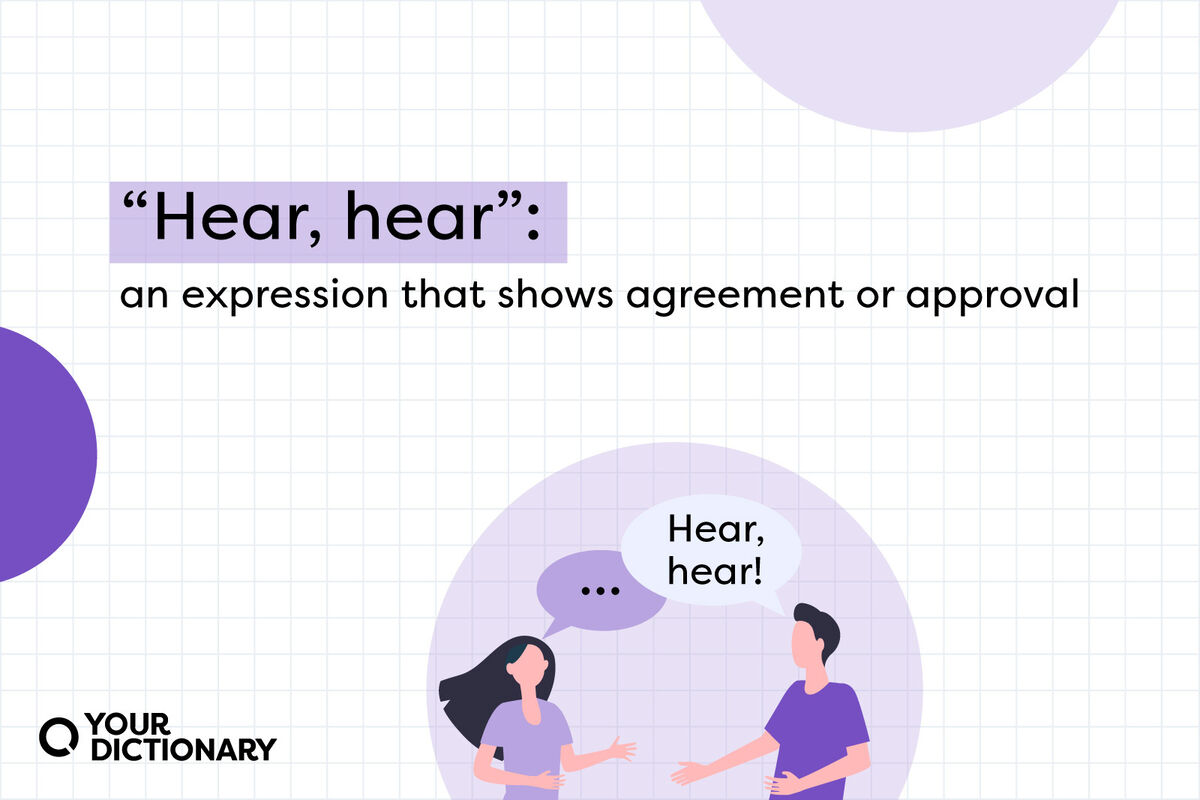
When you strongly agree with something a person said, you call out, “Hear, hear!” Or should it be “Here, here”? No one cares how it’s spelled when it’s spoken, but when you’re agreeing with someone over text or in an online comment section, incorrect spelling can get you trolled pretty hard. So which one can keep the trolls away?
“Hear, Hear” Is Correct
The correct way to say it is “Hear, hear” (comma included). It’s a sort of verbal applause that shows agreement with something, or it can be a response to a toast.
In both speech and writing, you’d use it like this:
- The senator declared that taxes were too high. “Hear, hear!” cried the audience.
- “To love, friends, and fun,” said the speaker, holding his glass high. “Hear, hear,” we responded, clinking our glasses together.
- “And that’s why I think this town is great,” I declared. “Hear, hear!” said my friend.
Because here is a homophone for hear, writing “Here, here” is a common spelling mistake. But if you want to be totally accurate when voicing agreement online, the proper way to do it is “Hear, hear.”
The Origin and Meaning of “Hear, Hear”
The word hear is a verb meaning “to perceive with the ears.” But why do we use it to mean “I agree” — and why twice?
According to the Oxford English Dictionary, “Hear, hear” comes from the 17th-century British Parliamentary phrase “Hear him, hear him.” It emphasized the speaker’s point to other listeners, as if to say “Listen to this guy! He’s right!”
Hear him is an imperative sentence — it’s commanding or suggesting others to listen. (Note that the speaker was always a him, as women were not elected to the House of Commons until 1918, and “Hear him” had already transitioned to the shorter “Hear, hear” by then.)
Today, the interjection “Hear, hear” is still the acceptable form of cheering and agreement in the British House of Commons, as well as in casual British and American conversation. You can say it in a formal business meeting, a law school classroom, or a casual barbecue in your backyard when someone states that well-done steak is no longer steak. (Hear, hear!)
Why Do You Need the Comma?
“Hear, hear” has a comma because “Hear him, hear him” has a comma. But imagine how confusing it would look if the phrase was “Hear him hear him.” The first hear would be imperative, but what about the second one? It sounds like you’re saying, “Listen to the person who listens to someone else.” It doesn’t make sense. (Just another example of punctuation marks being everyday superheroes.)
What About “Hear Ye, Hear Ye”?
Many consider the source of “Hear, hear” to be the medieval call “Hear ye, hear ye,” which speakers would say to get a crowd’s attention. However, “Hear ye, hear ye” means “Listen to me,” not “Listen to that person.”
“Hear him, hear him” adds no new information to the argument, only agreement — making it a more convincing predecessor to “Hear, hear.”
Why Do People Say “Here, Here”?
The word here may be a homophone to hear, but it’s an entirely different word. Here is an adverb of place that shows where an action happens. “Here, here,” describes the place where you are — twice.
But it’s easy to see why people would think “Here, here” is the more reasonable choice of the two phrases. After all, they sound exactly the same when you say them out loud, and you say “Here” when someone calls roll. And when you agree with someone, you could note your location (“here”) as the place where the agreement comes from.
All right, that last one is a stretch. But the truth is, "here here" is more popular — and the simple reason is that people don’t know the history of “hear, hear,” and “here, here” simply looks more correct to many people.
Spelling Is Important (Hear, Hear!)
“Hear, hear” isn’t the only expression we use that has confusing wording. Get these sayings right on paper by learning where they come from — and what they really mean. Is it bear with me or bare with me? Should you stop things by nipping them “in the bud” or “in the butt'”?